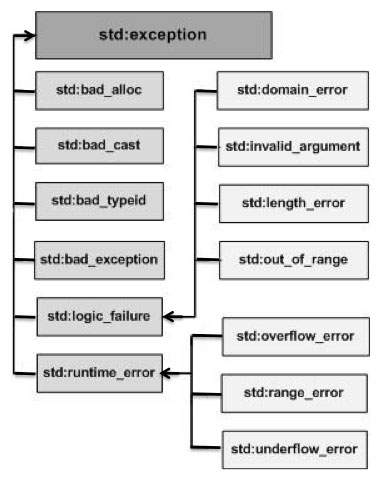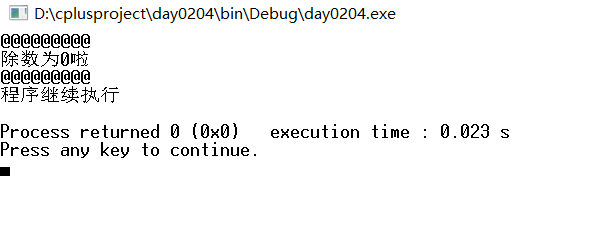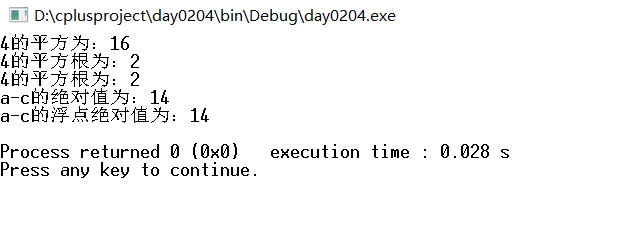文章目录
C++100-C++拓展-异常平方根计时功能

摘要
本系列为C++学习系列,会介绍C++基础语法,基础算法与数据结构的相关内容。本文为C++拓展内容,包括i异常处理,平方计算和计时功能,并提供相关案例练习。
在线练习:
http://noi.openjudge.cn/ch0104/
C++异常实现
参考:http://c.biancheng.net/view/2330.html
C++异常简介
C++程序的错误大致可以分为三种,分别是语法错误、逻辑错误和运行时错误:
- 语法错误在编译和链接阶段就能发现,只有 符合语法规则的代码才能生成可执行程序。
- 逻辑错误是说我们编写的代码思路有问题,不能够达到最终的目标,这种错误可以通过调试来解决。
- 运行时错误是指程序在运行期间发生的错误,例如除数为 0、内存分配失败、数组越界、文件不存在等。C++ 异常(Exception)机制就是为解决运行时错误而引入的。
遇到运行时错误,系统终止程序运行(程序崩溃Crash)。对此C++ 提供了异常(Exception)机制。
#include <iostream>
#include <string>
using namespace std;
int main(){
string str = "abcdefghijklmn";
char ch1 = str[27]; //下标越界,ch1为垃圾值
cout<<ch1<<endl;
char ch2 = str.at(27); //下标越界,抛出异常
cout<<ch2<<endl;
return 0;
}
输出:
terminate called after throwing an instance of ‘std::out_of_range’
what(): basic_string::at: __n (which is 27) >= this->size() (which is 14)
at() 是 string 类的一个成员函数,它会根据下标来返回字符串的一个字符。与[ ]不同,at() 会检查下标是否越界,如果越界就抛出一个异常;而[ ]不做检查,不管下标是多少都会照常访问。
常见的异常:

C++异常捕获
异常捕获语句:
try{
// 可能抛出异常的语句
}catch(exceptionType variable){
// 处理异常的语句
}
捕获异常
#include <iostream>
#include <string>
#include<exception>
using namespace std;
int main()
{
string str = "abcdefghijklmn";
try
{
char ch1 = str[27]; //下标越界,ch1为垃圾值
cout<<ch1<<endl;
cout<<"1 的内部"<<endl;
}
catch(exception e)
{
cout<<"1 out of bound "<<endl;
cout<<"1 数组下标越界"<<endl;
}
try
{
char ch2 = str.at(27); //下标越界,抛出异常
cout<<ch2<<endl;
cout<<"2 的内部"<<endl;
}
catch(exception e)
{
cout<<"2 out of bound"<<endl;
cout<<"2 数组下标越界"<<endl;
}
return 0;
}
输出为:

捕获指定异常 std::out_of_range e
#include <iostream>
#include <string>
#include<exception>
using namespace std;
int main()
{
string str = "abcdefghijklmn";
try
{
char ch1 = str[27]; //下标越界,ch1为垃圾值
cout<<ch1<<endl;
cout<<"1 的内部"<<endl;
}
catch(exception e)
{
cout<<"1 out of bound "<<endl;
cout<<"1 数组下标越界"<<endl;
cout<<e.what()<<endl;
cout<<"$$$$$$$$$$"<<endl;
}
try
{
char ch2 = str.at(27); //下标越界,抛出异常
cout<<ch2<<endl;
cout<<"2 的内部"<<endl;
}
//catch(std::bad_alloc e) //这个无法捕获
catch(std::out_of_range e)
{
cout<<"2 out of bound"<<endl;
cout<<"2 数组下标越界"<<endl;
cout<<e.what()<<endl;
cout<<"$$$$$$$$$$"<<endl;
}
return 0;
}
输出为:

捕获throw的异常
#include <iostream>
#include <string>
#include<exception>
using namespace std;
int main()
{
string str = "abcdefghijklmn";
try
{
throw "Unknown define Exception"; //抛出异常
cout<<"throw后的语句是否会输出."<<endl;
}
catch(exception e)
{
cout<<"$$$$$$$$$$"<<endl;
cout<<e.what()<<endl;
cout<<"$$$$$$$$$$"<<endl;
}
catch(const char* &e)
{
cout<<"@@@@@@@@@"<<endl;
cout<<e<<endl;
cout<<"@@@@@@@@@"<<endl;
}
return 0;
}
输出为:

抛出int异常并捕获
#include <iostream>
#include <string>
#include<exception>
using namespace std;
int main()
{
string str = "abcdefghijklmn";
try
{
int a = 6;
throw a;
//throw "Unknown define Exception"; //抛出异常
cout<<"throw后的语句是否会输出."<<endl;
}
catch(exception e)
{
cout<<"$$$$$$$$$$"<<endl;
cout<<e.what()<<endl;
cout<<"$$$$$$$$$$"<<endl;
}
catch(const char* &e)
{
cout<<"@@@@@@@@@"<<endl;
cout<<e<<endl;
cout<<"@@@@@@@@@"<<endl;
}
catch(const int &e)
{
cout<<"@@@@@@@@@"<<endl;
cout<<e<<endl;
cout<<"@@@@@@@@@"<<endl;
}
return 0;
}
输出为:

除数为0的异常捕获
#include <iostream>
#include <string>
#include<exception>
using namespace std;
int main()
{
string str = "abcdefghijklmn";
try
{
int a = 6;
int b = 0;
int c;
if(b==0)
{
throw "除数为0啦";
}
c = a/b;
cout<<"throw后的语句是否会输出."<<endl;
}
catch(exception e)
{
cout<<"$$$$$$$$$$"<<endl;
cout<<e.what()<<endl;
cout<<"$$$$$$$$$$"<<endl;
}
catch(const char* &e)
{
cout<<"@@@@@@@@@"<<endl;
cout<<e<<endl;
cout<<"@@@@@@@@@"<<endl;
}
cout<<"程序继续执行"<<endl;
return 0;
}
输出为:

C++实现求平方和平方根
利用math.h的pow求平方和平方根
#include<iostream>
#include <math.h>
using namespace std;
int main()
{
//平方 pow()
int a = pow(4,2);// 4的平方=16
cout<<"4的平方为:"<<a<<endl;
//开方
int b = pow(4,0.5);// 4的平方根=2
cout<<"4的平方根为:"<<b<<endl;
int c = sqrt(4);// 4的平方根=2
cout<<"4的平方根为:"<<c<<endl;
//整数绝对值
int d = abs(a-c);
cout<<"a-c的绝对值为:"<<d<<endl;
//浮点数绝对值
double e = fabs(a-c);
cout<<"a-c的浮点绝对值为:"<<e<<endl;
return 0;
}
输出为:

利用math.h求开根号
#include<iostream>
#include <math.h>
using namespace std;
int main()
{
double x=4.0,result;
result=sqrt(x);
cout<<"4的平方根是"<<result<<endl;
return 0;
}
输出:

自定义pow函数实现求平方
#include<iostream>
using namespace std;
int i,n,m;
int pow(int x,int y){
int z=x;
for(i=0;i<y-1;i++){
z*=x;
}
return z;
}
int main(){
cin>>n>>m;
cout<<pow(n,m);
return 0;
}
输出为:

完成循环计时功能
参考:https://blog.csdn.net/csdner250/article/details/127912578
#include<iostream>
#include<stdio.h> //scanf,printf
#include<ctime> //time()
#include<windows.h>//Sleep(),system()
using namespace std;
int main()
{
//srand(time(NULL)); //srand(seed),seed是种子,此处为time(NULL)
//for(int i = 0; i < 5; i++)
//printf("%d\n",rand()%100);//头文件都是stdlib.h
//获得1-100随机数,只用rand每次出现"随机数"一样
while(1)
{
time_t now = time(NULL);//这个语句放循环里,保证每次输出变化
//用time_t声明变量,获取当前秒数,即距离1970 01.01 00:00:00的秒数
//此处now是1970距离现在的秒数
tm time = *localtime(&now);//tm是结构体名,time是变量名,tm_year等是成员名
//localtime()函数返回指向tm结构的指针,本地时间
//返回的是距离1970/01/01 00:00:00的秒数
int year = time.tm_year + 1900; //变量名.成员名访问成员
int month = time.tm_mon + 1;
int day = time.tm_mday;
int hour = time.tm_hour;
int min = time.tm_min;
int sec = time.tm_sec;
int week = time.tm_wday;
printf("%3d:%02d:%02d\n",hour,min,sec);
printf("%4d/%02d/%02d\n",year,month,day);
printf(" 星期%d\n",week);//这里不能少%2d,否则会报错invalid conversion from int to const char*
Sleep(1000);//每1000毫秒显示一次
system("cls");//用来清屏,防止无限输出三行,当然也可一行输出,最后加个\r(只回车不换行)
}
return 0;
}
参考:https://blog.csdn.net/weixin_46098577/article/details/119615384
#include<iostream>
#include<Windows.h> //Sleep()所需头文件
#include <iomanip> //setw()等控制符所需头文件
using namespace std;
int main()
{
int i = 0;
cout << "\n当前进度:";
while(i<=1000)
{
cout << "\r";//回到行首位置
//输出宽度 6,保留两位小数
cout << setw(6) << fixed << setprecision(2) << (float)i / 10 << "% ";
Sleep(5);
i++;
}
cout << endl << endl;
system("pause");
return 0;
}
在线练习:
总结
本系列为C++学习系列,会介绍C++基础语法,基础算法与数据结构的相关内容。本文为C++拓展内容,包括i异常处理,平方计算和计时功能,并提供相关案例练习。























 1431
1431











 被折叠的 条评论
为什么被折叠?
被折叠的 条评论
为什么被折叠?










